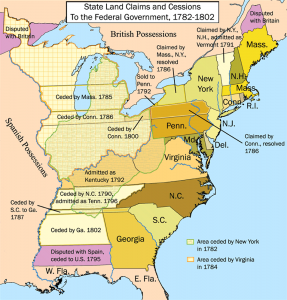No, not that one
Today in a very real sense is the birthday of the public domain in the United States.
No, not the public domain that The Legal Genealogist often writes about — for out-of-copyright materials.
That public domain isn’t a physical place; it’s a status.
No, this public domain is a physical place: the public lands of the United States.
 And, realistically, it got the start it needed 233 years ago today, on 20 December 1783.
And, realistically, it got the start it needed 233 years ago today, on 20 December 1783.
That’s when Virginia formally, officially and finally ceded its claims over vast amounts of western lands to the federal government.
It wasn’t the first state cession of land claims, no. New York had ceded its claims to western lands as early as 1780-1781,1 and Virginia itself had passed a cession ordinance in 1781.2
The problem was, Virginia had written conditions into that earlier 1781 land cession that Congress wasn’t willing to accept. The biggest one was that any purchases from Indians and all royal grants in the ceded lands were void — and that brought out the land speculators in force. They lobbied Congress not to accept the deal.3
As you can imagine, the Virginians were not amused. It got bad enough that Patrick Henry started arguing that Virginia should set up its own set of “small republicks” to its west — and the Governor of Virginia sent a letter to the delegates in Congress: “Please to inform my Friend Charles Thomson that I will send him a Copy of the Cession of the back Country by the next Post and with it a Copy of another resolution repealing it, which may perhaps be a lesson in future not to refuse a good offer when Men are in the Humor for giving.”4
The dispute seriously threatened the future of the new nation. The problem was that many states didn’t have any claims to any western lands, and didn’t see how they could compete with the states that did. Maryland in particular felt itself greatly disadvantaged. Something had to be done.5
Fortunately, cooler heads both in the federal government and in Virginia prevailed. A Congressional committee reviewed the Virginia conditions again and bought into some of them, and Virginia itself gave up some of its demands. This was to the great credit of the Virginians. As the National Archives’ editorial note stresses:
Thus, both in her own legislature and in Congress, Virginia placed the welfare of the nation above special interests in her effort to create a national domain. … (The) Virginia Acts of cession of 1781 and 1783 stand as a monument to the strength of national feeling in the post-Revolutionary period and to the solid accomplishments of the Confederation. … (It) is an enduring tribute to the temper of Virginia’s councils that … the national welfare was placed first. No other state, then or since, ever yielded so great a natural resource to the domain of the whole people.6
And so was born, really, the public domain of the United States: the public land base and public land distribution system that opened up the west — that made possible things like the Northwest Ordinance of 17877 and the Homestead Act of 1862.8
So many of our ancestors benefited from the public land system.
I know mine did: in Alabama, in Mississippi, and elsewhere.
Thanks to Virginia, and its commitment to national unity.
SOURCES
Image: “United States land claims and cessions 1782-1802,” KMusser, via Wikimedia, CC-BY-SA 2.5
- Walter Charles Haight, “The Binding Effect of the Ordinance of 1787,” II Publications of the Michigan Political Science Association (Sep 1897): 2-3; digital images, Google Books (http://books.google.com : accessed 19 Dec 2016). ↩
- See “Editorial Note: The Virginia Cession of Territory Northwest of the Ohio,” Founders Online, U.S. National Archives, rev. 6 Dec 2016 (http://founders.archives.gov/ : accessed 19 Dec 2016). ↩
- Ibid. ↩
- Ibid. ↩
- Haight, “The Binding Effect of the Ordinance of 1787,” 1-2. ↩
- “Editorial Note: The Virginia Cession of Territory Northwest of the Ohio,” Founders Online. ↩
- “An Ordinance for the government of the territory of the United States North West of the river Ohio,” 32 Journals of the Continental Congress 334 et seq. (Washington D.C. : Government Printing Office, 1936); digital images, “A Century of Lawmaking for a New Nation: U.S. Congressional Documents and Debates, 1774-1875,” Library of Congress, American Memory (http://memory.loc.gov/ammem/index.html : accessed 19 Dec 2016). ↩
- Ibid., “An Act to secure Homesteads to actual Settlers on the Public Domain,” Act of 20 May 1862, 12 Stat. 392. ↩



Hi, Judy Russell: I was wondering if you would allow me to copy this particular article about the public domain to my genealogy group’s Facebook page, giving your blog the credit, of course. It’s nice to see some good words about the State/Commonwealth of Virginia!
It’d be a lot easier for you to share my public post from my timeline on Facebook here. (Just scroll down to the post and hit Share and then put it anywhere you’d like!)
While magnanimous at the time, didn’t this come back to bite all of us in the slave state issue in the early-mid 1800s? I seem to think they used this as leverage in that debate, sadly.